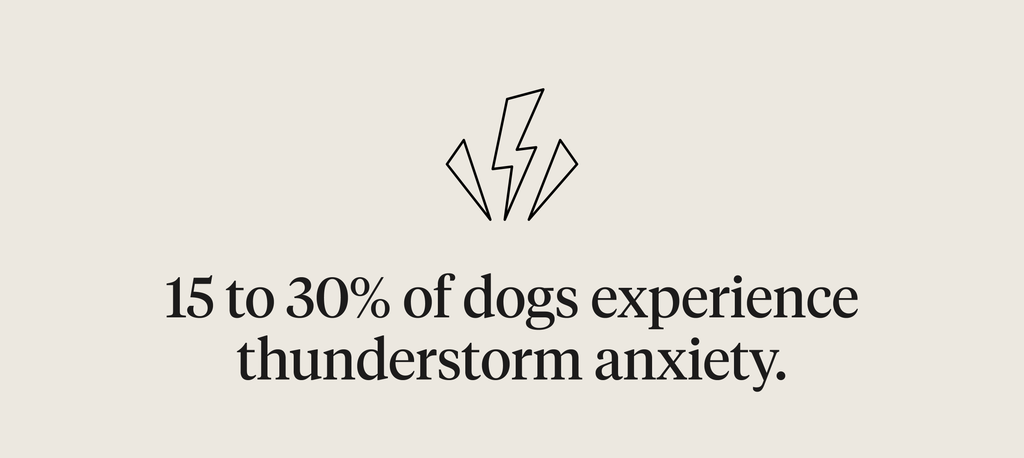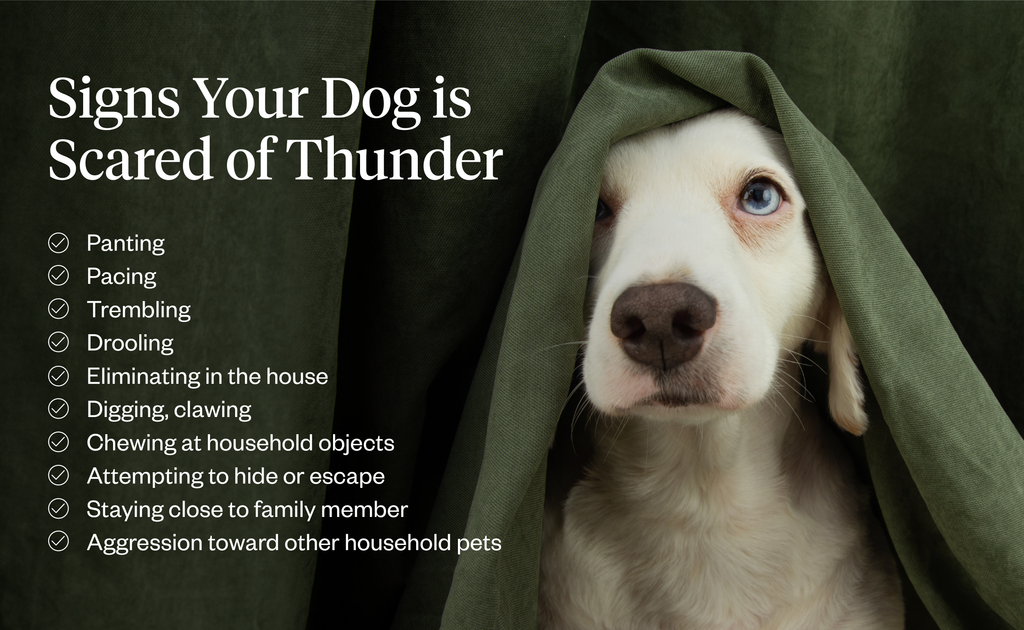11 Min Read
Why Are Dogs Afraid Of Thunder?
Key takeaway

Why pet owners are switching to online vet care with Dutch
-
Prescriptions delivered free to you
-
Fast access to Licensed Vets over video
-
Unlimited video visits and follow-ups
If you're a pet parent, you may notice your dog runs and hides, shakes, or pants excessively when it thunders. Many dogs are afraid of thunder because it's unpredictable and signifies danger. They hear a loud noise, and they simply don't know what it is.
Many dogs have noise phobias, so if your dog is afraid of thunder, they may also be afraid of fireworks. So why are dogs afraid of thunder? Unfortunately, we can't ask them, but we do know it’s a common experience. An estimated 15-30% of dogs experience thunderstorm anxiety.1 So if your dog experiences the symptoms of anxiety or panic attacks when it storms, they're not alone.
This article will explore the reasons behind your dog's fear of thunder and what you can do to help comfort them.
- Reasons Dogs Fear Thunder
- Signs Your Dog is Scared of Thunder
- What to Do if Your Dog is Scared of Thunder
- FAQs
- Final Notes

Reasons Dogs Fear Thunder
So why are dogs so afraid of thunder? Many dogs fear thunder because it's loud and unpredictable.2 While dogs may be able to sense factors leading up to a storm, they can't predict when loud and sudden thunder will strike.
Dogs have more sensitive ears than humans. To put this into perspective, humans can't hear sounds above 20,000 Hertz, but dogs can hear sounds as high as 45,000 Hertz.3 So when your dog hears thunder, it's actually much louder to them.
Additionally, animals in the wild are fearful of thunderstorms because they can be dangerous for them. When wild animals are out during storms, they can become injured or killed. Dogs are still animals. While they've been domesticated for thousands of years, they still have some of their natural instincts, so fearful behavior during thunderstorms comes naturally to them.2 So why are some dogs not afraid of thunder? Ultimately, every dog is different. A dog not afraid of thunder may be afraid of other noises like fireworks. If your dog hasn't had a bad experience during a thunderstorm, they're less likely to be afraid of it.
Dogs can also fear thunder because of the damage they cause. For instance, if a dog has experienced a tree falling on their home during a storm, they may be more likely to experience storm phobias. Additionally, fear of noises can be attributed to a lack of socialization during puppyhood. Ultimately, any dog can become afraid of thunder regardless of their age or how many storms they've lived through.2
If you live in a multi-pet household, you might notice your cats don't seem as afraid of thunder as your dogs. So why are dogs afraid of thunder, but cats aren't? Ultimately, any dog or cat can be afraid of thunder or anything else. You might just not realize your cat is afraid because they hide during storms, so you don't actually see their symptoms of fear.

Signs Your Dog is Scared of Thunder
Fear of thunder is a type of noise phobia. You can tell if your dog suffers from a fear of thunder by reading their body language or, in some cases, listening to them. Common signs your dog is afraid of thunder include the following:
- Panting
- Pacing
- Whining
- Trembling
- Inappropriate urination or defecation
- Digging and clawing at floors and walls
- Chewing household objects
- Trying to escape
- Hiding
- Neediness2
Dogs can experience fear differently, but if you notice any of the above signs of anxiety during a storm or after your dog hears thunder, it may indicate a thunder or noise phobia.
Some dogs can experience redirected aggression toward other household dogs or family members because of their fear, which can result in dog fights and injuries.2 Additionally, because some dogs may try to escape, it's crucial to keep your dog's fearfulness under control to prevent them from running away or getting hurt.
During a thunderstorm, your dog may become your shadow. When they're afraid, some dogs want to be as close as possible to their human companions for comfort, and being near you is their way of telling you they're afraid.
What to Do if Your Dog is Scared of Thunder
Unfortunately, there's no way of knowing exactly why your dog is afraid of thunder. However, there are ways to help them feel more calm and comfortable during a storm. The key to controlling your dog's anxiety is to replace the fearful response with a positive response.4 Here are a few methods of helping your dog through thunderstorms:
1. Stay calm
It can be stressful when your dog starts panting, pacing, trembling, or trying to sit on top of you because they're afraid of thunder. After all, no pet parent wants to see their dog distressed. However, it's crucial to provide your dog with a calm environment, and that means staying calm yourself. You shouldn't ignore your dog during storms because giving them attention is a good way to comfort them while making the experience less frightening for them.2
2. Provide a sanctuary space
Giving your dog a sanctuary space where they can go to wait out the storm can provide them with some comfort.4 If your dog already has a sanctuary space, they may go to it instinctively when they experience anxiety. However, if your dog doesn't have this space already, you can create a sanctuary space in a safe, windowless room or use their crate with a cover. You can also add a white noise machine to block out any noise, although it may be impossible to completely block out loud thunder.
Giving your dog a sanctuary space that blocks sound and doesn't allow them to see the storm can help them feel safe and secure. However, it may be helpful to stay in the room with your dog and talk to them or pet them to help them feel calmer.
3. Behavior Modification & Training
The socialization period for puppies is up to four months of age. During this time, it's crucial to introduce them to new experiences, which may include thunderstorms and fireworks. Socialization isn't just the process of introducing puppies to other people and pets; it acclimates them to all types of experiences, sights, smells, and sounds.
Unfortunately, even with proper socialization at a young age, adult and senior dogs can become afraid of thunder. Instead, you'll need to work on desensitization and counterconditioning. Desensitization gradually exposes your dog to a trigger — the sound of thunder — and eventually increases that exposure to minimize their reaction. Meanwhile, counterconditioning changes the dog's emotional response to the trigger.
Yet, because there are so many stimuli involved with a thunderstorm, such as smells, rain, humidity, and lightning, that can't be replicated, desensitization might not be enough to quell your dog's fear.2 However, counterconditioning is still an option because it changes a dog's emotional response to a storm. For instance, if you give your dog a piece of cheese every time it storms, they may begin to associate it with a positive experience.
Of course, training takes time, so these options won't help you relieve your dog's anxiety immediately.
4. Create distractions
Many dogs afraid of thunder engage in destructive behavior because it replaces their anxiety with something they enjoy; it's essentially their way of calming themselves.2 However, you can distract your dog with chew toys, games, and treats to create distractions and make them forget about the thunder.
Since thunder can be so frightening to dogs, you should consider what your dog loves to do most. For instance, some dogs are food motivated, while others prefer toys. If your dog enjoys treats and toys, consider giving them a puzzle or treat-dispensing toy they can play with.
It's worth noting that some dog anxiety can be so extreme they won't take treats or engage in their favorite activities. If this sounds like your dog, consider moving on to the next tip for help.
5. Talk to your vet
Talk to a vet if your dog experiences extreme anxiety during storms. Your vet can help find the best way to treat anxiety for your dog's particular phobia, which may include medication. Many dogs benefit from fast-acting, short-term anxiety medications like trazodone.
However, it's important to note that these medications can take time to start working, so you must be able to predict when a storm will happen. If you give your dog medication as soon as the storm starts, and it doesn't last very long, the medication may not work.
FAQs
Why do dogs shake during thunderstorms?
Dogs typically shake during thunderstorms because they're afraid. If your dog suffers from any type of fear or anxiety, trembling is one of the most common signs. They may also display other signs of fear, such as panting, pacing, hiding, or trying to escape.
Which dog breeds are afraid of thunder?
Any dog breed can be afraid of thunder because it's not just about the breed. However, some dogs, like Wheaten terriers and Lagotto Romagnolos, have more noise sensitivity than others. Still, experiences play a significant role in whether your dog will experience fear.5
Why are some dogs afraid of thunder and others aren't?
As mentioned, it's possible some dogs are afraid of thunder while others aren't because of past experiences. For instance, if a dog was outside during a thunderstorm and a tree fell near them, it may be more likely to experience an aversion to thunder, rain, and wind.
Some dogs experience early conditioning through socialization and storms throughout their lives.6 During the critical stages of development, playing with your puppy or giving them treats during a storm can condition them not to be afraid.
Additionally, some dogs are more stressed than others. Dogs have different temperaments, and some may be predisposed to stress, anxiety, and fear due to their genetics and upbringing.6
Can dogs sense thunder coming?
Dogs can't necessarily predict thunder, but they may be able to sense storms through drops in barometric pressure, which can worsen their anxiety. Many humans can sense storms coming due to a change in the smell, signs of rain clouds, and how their bodies feel, with some individuals more sensitive to weather changes than others.
The same is true for dogs. However, dogs have much stronger senses of smell and hearing, so it's possible that they can sense when a storm is approaching better than humans.

Final Notes
Many dogs experience noise phobias like thunder that can upset their entire day. A fearful dog may start experiencing the symptoms of anxiety minutes before actually hearing thunder, and it can cause undesirable behaviors ranging from trying to escape to panting and even aggression and destruction.
No pet parent wants their dog to experience anxiety. Dutch telemedicine for pets helps pet parents manage and treat their dog's storm phobias from the comfort of home. Try Dutch today.
Share
References
-
Mulhollem, Jeff. "Research Aimed at Finding Way to Soothe Thunderstorm-Stressed Dogs." Penn State University, www.psu.edu/news/agricultural-sciences/story/research-aimed-finding-way-soothe-thunderstorm-stressed-dogs/.
-
Fear of Thunderstorms & Fireworks - University of Pennsylvania School ..., www.vet.upenn.edu/docs/default-source/ryan/ryan-behavior-medicine/fear-of-thunderstorms-amp-fireworks-(pdf).pdf.
-
Bear, Mark F., author. Neuroscience : Exploring the Brain. Philadelphia :Wolters Kluwer, 2016.
-
"Help Fido through Thunderstorms, Fireworks and Other Noise Phobias." School of Veterinary Medicine, 28 June 2022, www.vetmed.wisc.edu/help-fido-through-thunderstorms-and-fireworks/.
-
Linn Mari Storengen, Frode Lingaas, Noise sensitivity in 17 dog breeds: Prevalence, breed risk and correlation with fear in other situations, Applied Animal Behaviour Science, Volume 171, 2015, Pages 152-160, ISSN 0168-1591, https://doi.org/10.1016/j.applanim.2015.08.020.
-
Magazine, Smithsonian. "Why Fireworks Scare Some Dogs but Not Others." Smithsonian.Com, 26 June 2020, www.smithsonianmag.com/science-nature/firework-fear-why-your-dog-does-or-doesnt-react-and-how-you-should-180975182/.


